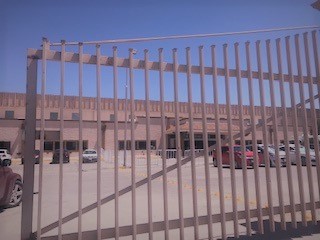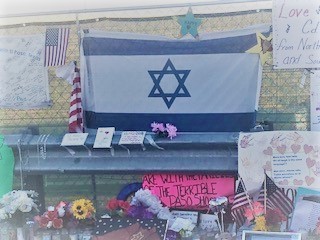
This week, I traveled to El Paso and Juarez with a small delegation of HIAS leadership. We spent time both in El Paso and Juarez. We did not go to any ICE detention centers but we did travel to a shelter in Juarez run by the Mexican government, which holds 500 people, all families.
When we arrived, we were surrounded by beautiful, smiling children and their parents. The parents were staging a modest protest because they had just been informed they could only stay in the shelter for two weeks and then they would be released to the streets, basically to fend for themselves. They were understandably terrified. Several of the parents spoke English and they shared stories of the terror they left behind in their home countries. I have to admit that I started to cry. Looking at the faces of these desperate families, I kept asking myself, "this is who our government is so scared of?"
Another challenging meeting was with immigration lawyers from DHIA, Las Americas and HIAS who spoke to us candidly about their own secondary trauma from dealing with the relentless need of their clients and their inability under these new strictures to win asylum for any of them. They work day and night and feel that if they give themselves any needed time off, no one will be there to help. Their trauma was compounded by the terror attack and the feeling that they are no longer safe anywhere.
The only bright spot in any of this is the work of HIAS. I am so proud knowing there are members of the Jewish community who are there to help. If you want to know more about what is happening at the border, make sure you visit the
HIAS website.
-Rabbi Debra Newman Kamin, President, Rabbinical Assembly
Note: This webinar with HIAS provides an up-to-the-minute update on the administration's moves to sharply cut refugee resettlement to the United States, denying protection to people fleeing terror and persecution around the world. We discussed the U.S. asylum program, and the cruel and egregious policies targeting those who come to our country in search of safety. We also encourage you to take action by signing this petition urging President Trump to settle at least 95,000 refugees.
 I have learned a lot about how a community can respond to tragedy since the Walmart shooting. El Paso is truly a special place. This community, as a whole, has responded to tragedy with caring and compassion. Even the poorest of the poor have donated to help the victims of the shooting. The fund set up to assist the families of the victims of the shooting has received over $5 million dollars and expressions of care continue, even three weeks after the tragedy. When we visited the memorial today, people were still coming to pay tribute. The flowers and the posters that are there speak powerfully to the sense of connection that the residents of this wonderful city feel towards each other.
I have learned a lot about how a community can respond to tragedy since the Walmart shooting. El Paso is truly a special place. This community, as a whole, has responded to tragedy with caring and compassion. Even the poorest of the poor have donated to help the victims of the shooting. The fund set up to assist the families of the victims of the shooting has received over $5 million dollars and expressions of care continue, even three weeks after the tragedy. When we visited the memorial today, people were still coming to pay tribute. The flowers and the posters that are there speak powerfully to the sense of connection that the residents of this wonderful city feel towards each other.
El Paso is a place where there is no tolerance for hate. After the shooting, the city adopted the phrase, "El Paso strong!" It is devastating to see 22 innocent people gunned down solely because of their race. But the strength of El Paso, which rightfully prides itself as a city on a border defined geographically by two countries and three states, is the fact that we are one community, living in powerful synergy, defined by a spirit that is not bound by borders but abounds in love, kindness, and a brotherly sense of humanity. Our differences may be broad economically, educationally, religiously, and culturally, but we come together and need one another. It is truly a privilege to serve this community, especially in a time of tragedy. -Rabbi Scott Rosenberg, Congregation Bnai Zion, El Paso, Texas
Note: Here are three ways you can take action against gun violence today.
 This week, I traveled to El Paso and Juarez with a small delegation of HIAS leadership. We spent time both in El Paso and Juarez. We did not go to any ICE detention centers but we did travel to a shelter in Juarez run by the Mexican government, which holds 500 people, all families.
This week, I traveled to El Paso and Juarez with a small delegation of HIAS leadership. We spent time both in El Paso and Juarez. We did not go to any ICE detention centers but we did travel to a shelter in Juarez run by the Mexican government, which holds 500 people, all families. I have learned a lot about how a community can respond to tragedy since the Walmart shooting. El Paso is truly a special place. This community, as a whole, has responded to tragedy with caring and compassion. Even the poorest of the poor have donated to help the victims of the shooting. The fund set up to assist the families of the victims of the shooting has received over $5 million dollars and expressions of care continue, even three weeks after the tragedy. When we visited the memorial today, people were still coming to pay tribute. The flowers and the posters that are there speak powerfully to the sense of connection that the residents of this wonderful city feel towards each other.
I have learned a lot about how a community can respond to tragedy since the Walmart shooting. El Paso is truly a special place. This community, as a whole, has responded to tragedy with caring and compassion. Even the poorest of the poor have donated to help the victims of the shooting. The fund set up to assist the families of the victims of the shooting has received over $5 million dollars and expressions of care continue, even three weeks after the tragedy. When we visited the memorial today, people were still coming to pay tribute. The flowers and the posters that are there speak powerfully to the sense of connection that the residents of this wonderful city feel towards each other.